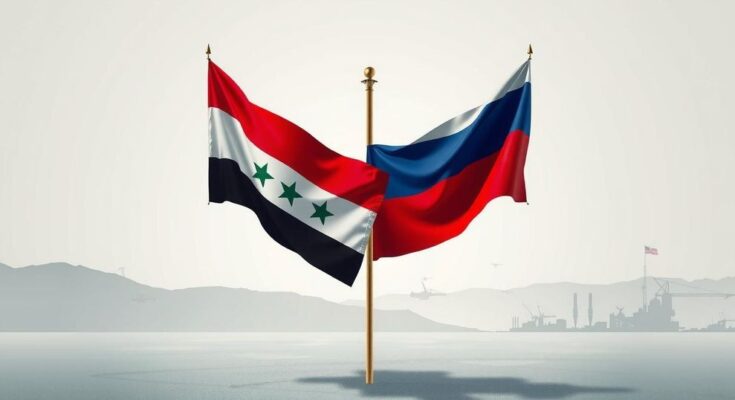Syria’s interim President Ahmed Sharaa seeks to renegotiate terms with Russia regarding military bases post-Assad. Former rebel groups now oversee these bases, highlighting a significant shift in control. Enhanced diplomatic backing and financial aid are critical for Syria moving forward. This evolving partnership underscores the complexities of international relations amid ongoing humanitarian crises in Syria.
For years, Russian military personnel from the Hmeimim Air Base in Syria operated with relative freedom, launching attacks against Islamist factions opposed to Bashar al-Assad’s regime. However, with Assad having fallen from power, the security dynamics have changed significantly. Former rebels from the Islamist group Hayat Tahrir al-Sham (HTS) now safeguard the bases, which are crucial for maintaining Russia’s military influence in the region.
Syria’s interim President Ahmed Sharaa is currently seeking to renegotiate Russia’s long-term leases on these military installations. While he aims to secure more favorable terms, it seems he is not inclined to exclude Russia entirely from Syrian affairs. Instead, maintaining the bases may be contingent upon receiving essential diplomatic support and economic assistance from Moscow.
Following the downfall of Assad, Russia finds itself in a complex position, negotiating with a leadership that was once its adversary. Throughout the discussions, issues such as Syria’s substantial debt and the potential repatriation of funds believed to be held in Russia surfaced, highlighting the intricate nature of their dealings.
Despite current economic challenges and lingering international sanctions, Syria’s leaders are displaying a willingness to engage with their former foes. Analysts suggest that Moscow’s stabilizing presence could offer a necessary lifeline to the war-torn nation, as Russia continues to wield significant influence in Damascus’s future direction.
In a recent meeting, Sharaa expressed a desire to address outstanding debts to Russia, reflecting Syria’s precarious financial situation exacerbated by the war. Notably, the future of Assad remained a topic of broad discussion, although neither side viewed his return as a major obstacle in re-establishing relations.
The ongoing interaction between Syria and Russia serves strategic interests for both sides, as Syria navigates pressures from various international forces. Moreover, the rebuilding of war-ravaged infrastructure in Syria, estimated to cost approximately $400 billion, underscores the urgent need for resources that Russia could potentially provide, despite its historical ties with the previous regime.
From humanitarian perspectives, Russia has proposed utilizing its bases to deliver aid, although evidence of such efforts remains scant. As the Syrian war continues to demand attention, the humanitarian situation grows dire, emphasizing the necessity for a renewed Russian-Syrian partnership that acknowledges the realities on the ground and aims to alleviate suffering among the population.
In summary, Syria’s negotiation with Russia regarding military bases reflects the significant shifts in political power and alliances following Assad’s departure. Both parties are exploring ways to continue their partnership through trade and diplomacy while addressing their respective needs. The complexity of the situation indicates a multifaceted relationship poised to adapt as new challenges arise in the region.
Original Source: stratnewsglobal.com




